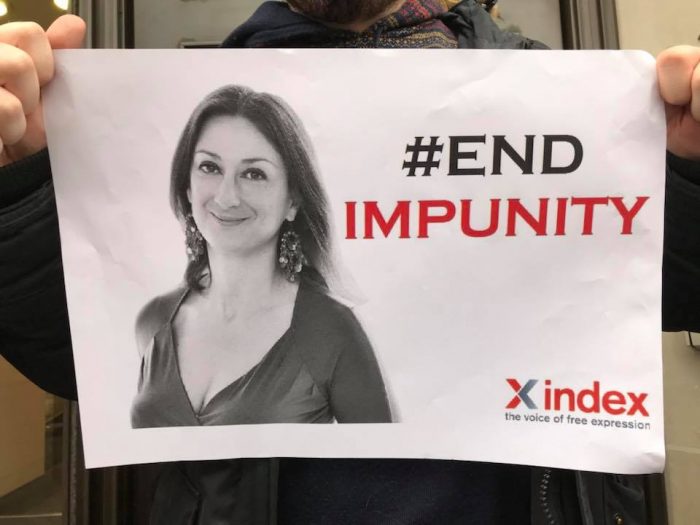7 Mar 2018 | Campaigns -- Featured, Statements

Slovak investigative journalist Jan Kuciak was murdered in February 2018.
Dear President Juncker,
We, the undersigned organisations, are deeply saddened and appalled by the recent killings of Slovak journalist Ján Kuciak and Maltese journalist Daphne Caruana Galizia. These killings on European soil in retaliation for the investigative reporting by these journalists are simply unacceptable.
We welcome the condemning of these killings by the European Union (EU) institutions. However, we demand that no further time is wasted and these words are followed by action. We urge high-level officials from the European Commission to retain regular communication with senior police authorities in Slovakia and Malta to ensure that police investigations are full, thorough and independent.
Moreover, the European Commission must take the lead and hold state officials and public figures to account for creating an environment in which the critical function of journalism is respected. State officials and public figures should consistently speak out in support of the critical function of journalism and support journalists when they are attacked.
A climate in which impunity prevails and in which journalists are only respected when they serve the interests of those in power, paves the way for violence. These murders signal the urgent need to support civil society in the EU Member States in their efforts to fight impunity, and to document and promote accountability for violations of press freedom.
In today’s world where a journalist is killed every five days with almost full impunity as a result, we have to stop the European region from becoming an environment where journalists are no longer safe to do their work. We call on the European Commission to work, as a priority, with Member States to begin the process of establishing national protection mechanisms for journalists in Europe.

Matlese investigative journalist Daphne Caruana Galizia was murdered in October 2017.
When journalists are killed, they are silenced and the public is deprived of their stories. In the cases of Ján Kuciak and Daphne Caruana Galizia stories about corruption, organised crime and abuse of power. Stories the people have a right to know about.
Safety of journalists is a precondition for good journalism that serves the societies and audiences. Our European democracies cannot thrive when journalists are silenced and cannot inform people about important developments and hold power holders to account.
We urge the European Commission to call on the governments of its Member States to implement without any delay their existing commitments to provide a safe, enabling environment for journalists, flowing from numerous adopted United Nations resolutions on the safety of journalists and the Council of Europe recommendation on the Protection of Journalism and the Safety of Journalists and other media actors.
We urge the European Commission to take the lead in stepping up their efforts to protect journalists within Europe. The undersigned organisations stand ready to support in such efforts.
Your response to the killings of Ján Kuciak and Daphne Caruana Galizia will set a precedent for what is permissible in the European Union. A safe future for journalists in Europe is in your hands.
Yours sincerely,
ARTICLE 19
Committee to Protect Journalists
European Centre for Press and Media Freedom
European Federation of Journalists
European Journalism Centre
La Fundación para la Libertad de Prensa
Free Press Unlimited
Global Forum for Media Development
IFEX
International Federation of Journalists
Index on Censorship
International Media Support
International Press Institute
Rory Peck Trust
Reporters Without Borders
Samir Kassir Foundation – SKeyes Center for Media and Cultural Freedom
Transparency International
26 Feb 2018 | Campaigns -- Featured, Statements
Index on Censorship condemns the murder of investigative journalist Jan Kuciak in Slovakia — just months after the killing of Daphne Caruana Galizia in Malta. Kuciak was known for his investigations on tax fraud among businessmen connected to the country’s ruling party. He and his girlfriend were reported to have been shot dead at his home over the weekend, news website Dennik N reported on Monday, citing the Interior Ministry.
The murders raise troubling questions about the safety of media professionals in the European Union, says Index.
“A thorough and transparent investigation into the murder of Jan Kuciak is extremely important. Index calls on the European Union to ensure that an independent investigation takes place and that the legal process meets international standards” Index’s head of advocacy Joy Hyvarinen said. “Investigative journalism is vital to healthy democracies. In 2017, Index on Censorship’s Mapping Media Freedom platform documented 67 cases in which journalists were targeted with threats, violence and death for reporting on corruption.”
Corruption is becoming a major issue in the EU and neighbouring countries, undermining democracy and putting individuals at risk. Journalists play a key role in uncovering and fighting corruption through their investigations and, as a result, put themselves in danger.
On 16 October the Maltese journalist Daphne Caruana Galizia was murdered when the car she was driving exploded. Caruana Galizia published a number of articles on her blog investigating corruption.
“We need to stop behaving as if threats to journalists’ safety happen ‘somewhere else,’” said Index on Censorship CEO Jodie Ginsberg. “Prominent journalists in the United States get regular death threats – and are becoming used to it as part of their daily lives. Meanwhile, in the European Union two investigative journalists have been killed in less than six months. We need to wake up to this growing menace.”
On 16 August, Parim Olluri, editor-in-chief of investigative website Insajderi, was physically assaulted by unknown individuals outside his home in Kosovo’s capital Pristina. Olluri believes the attack was linked to his work. A few days before the assault, Olluri had published an editorial about corruption allegations against former Kosovo Liberation Army commanders, after which he received a torrent of abuse and threats on social media.
Failure to properly investigate cases and bring perpetrators to justice fosters an atmosphere encouraging further attacks.
19 Jan 2018 | Europe and Central Asia, European Union, Malta, Media Freedom, media freedom featured, News and features
[vc_row][vc_column][vc_column_text]
Journalists who dare to investigate powerful people or companies are facing increasingly expensive legal threats to stop them publishing.
Daphne Caruana Galizia, the Maltese investigative journalist who was assassinated in October 2017, was just one reporter who fought against these lawsuits. Strategic Litigation Against Public Participation (Slapp) lawsuits are not new nor are they limited to the media world, but they are incredibly powerful.
Daphne’s son Paul said: “Slapp lawsuits are designed to remove the truth from circulation by making it too expensive to assert. Malta’s political and business elite used them extensively against my mother Daphne Caruana Galizia who always stood her ground but, as an independent journalist, paid a heavy price in terms of stress, time wasted and money spent on her own defence.”
Leading freedom of expression advocates are worried about the power of these lawsuits and the way they are being used to stop publications.
Jodie Ginsberg, CEO of Index, said: “Having a media that is free to investigate corruption and abuse of power – and free to publish the results of those investigations – is fundamental to democracy. These vexatious lawsuits – deliberately aimed at preventing journalists from carrying out such work – must be stopped.”
Jonathan Price, a barrister with Doughty Street Chambers, said: “Media plurality and diversity are essential to a functioning democracy. But bloggers, citizen journalists, small-scale specialist publications and NGOs are most vulnerable to Slapp activity. A large corporate entity or wealthy individual is able to outspend and out-resource these independent media outlets well before any substantive court decision as to the merits of a particular case. All parties are aware of this inequality of arms, and just that simple awareness is enough to deter many small publishers from investigating and reporting on large corporates and wealthy individuals.
He added: “So there is the visible, practical censorship that is achieved by tying media organisations (of all sizes) up in spending time and money on possibly baseless litigation. And there is the self-censorship applied by the smaller publishers so as to avoid the dread of receiving a lengthy, highly aggressive letter from expensive libel lawyers.”[/vc_column_text][/vc_column][/vc_row][vc_row][vc_column][vc_column_text]A small Maltese news outlet, The Shift News, is fighting against Slapps and campaigning for legal changes in Malta to give more protection to journalists covering public interest stories. Opposition MPs in Malta are seeking to use a private member’s bill to change the law to stop international lawsuits being used to prevent Maltese journalists covering stories.
This comes after The Shift News was threatened with a lawsuit for an article about the alleged involvement in a scandal by the company Henley and Partners, which has been awarded a multi-million dollar contract to act as agent for a scheme through which Malta makes European citizenship available. Henley and Partners threatened legal action against The Shift in the UK and the US unless an article about the company’s alleged involvement in a passports-for-cash scandal in Grenada was removed. Henley and Partners deny any wrongdoing. The Shift News refused and instead published the threatening letter.
These kind of lawsuits are a problem in other countries too. For example, Albanian investigative journalists Besar Likmeta and Aleksandra Bogdani were sued for defamation by an influential judge and his wife. The journalists work for reporter.al, an investigative reporters’ platform in the Albanian language.
Fighting such lawsuits is extremely expensive – far too much for all but the largest media outlets. The result is censorship doled out by those with money: news and articles fail to appear, without anyone realising what has happened. Journalists are even told they must not mention these lawsuits or they will face further legal action.
A cross-party group of MEPs are now calling for new EU legislation to deter such lawsuits. “We are committed to the protection of investigative journalists and media freedom across the EU and will pursue this issue until Anti-Slapp EU legislation is in place,” they said.
Flutura Kusari, legal advisor to the European Centre for Press and Media Freedom, said that “in a Slapp lawsuit, the plaintiff does not aim to win a case, rather than to intimidate and discourage reporters from further reporting by placing them in long and costly judicial processes”.
There are some signs that the European Parliament is worried about the problem in a damning report recently published after a delegation of MEPs visited Malta. It identified many failings, including concerns about the effectiveness of the fight against corruption, with few investigations resulting in criminal prosecutions, and the weak implementation of anti-money laundering legislation. “The brutal assassination of Daphne Caruana Galizia was aimed at instilling fear in everyone, especially those involved in investigating and prosecuting cases of money laundering and corruption,” it said.
This is not just a problem in Europe, but in the USA there is some protection for journalists against vexatious legal actions. According to the Reporters Committee for Freedom of the Press, some US states, including California, Georgia and Texas, have laws that discourage lawsuits.
The use of expensive lawsuits to stop journalists reporting a story with a strong public interest is not a new tactic, but we must redress the balance against media investigations.
Joy Hyvarinen is head of advocacy at Index on Censorship[/vc_column_text][/vc_column][/vc_row][vc_row][vc_column][vc_basic_grid post_type=”post” max_items=”4″ element_width=”6″ grid_id=”vc_gid:1516373343229-cbca273b-69ee-8″ taxonomies=”18782″][/vc_column][/vc_row]
19 Jan 2018 | Campaigns -- Featured, Malta, Statements
[vc_row][vc_column][vc_column_text]On 19 January, Index on Censorship joined a letter calling on the Parliamentary Assembly of the Council of Europe to appoint a Special Rapporteur to monitor the investigation into the murder of Maltese investigative journalist Daphne Caruana Galizia, killed by a car bomb on 16 October 2017.
Joint open letter to the members of the Parliamentary Assembly of the Council of Europe: Call for a PACE Special Rapporteur on Daphne Caruana Galizia’s assassination and the crimes she exposed
Dear Members of the Parliamentary Assembly of the Council of Europe,
Daphne Caruana Galizia was by all accounts Malta’s most widely read and influential journalist. She had an immeasurable impact on Malta’s politics over the course of her thirty-year career and single-handedly uncovered some of the country’s biggest corruption scandals, exposing Maltese institutions for their unwillingness to pursue powerful and well-connected members of the country’s business and political class.
Known by her hundreds of thousands of readers in Malta and elsewhere simply as ‘Daphne’, she was assassinated on 16 October 2017 in broad daylight by a remote-controlled car bomb as she left her home in Malta.
Only months before, Daphne Caruana Galizia had uncovered systemic government corruption implicating senior members of her country’s government, showing how offshore structures exposed in the Panama Papers were used to receive and launder kickbacks on the sale of Maltese passports and process unexplained payments from members of Azerbaijan’s ruling family.
In a January 2018 report of a European Parliament fact-finding mission to Malta, the country’s Commissioner of Police confirmed on record that no police investigations took place into any of Daphne Caruana Galizia’s Panama Papers revelations. The senior government figures implicated in her investigative reporting remain in public office.
In a context of complete impunity for the high-level corruption Daphne Caruana Galizia exposed and the legal, financial and other threats she faced from figures in or close to government before her assassination, her killing has underlined in shocking fashion the extent of corruption and rule of law failings in Malta. The threat to the country’s liberal democracy and press freedom is a real one: Malta has slipped sixteen places in a single year in Freedom House’s latest global ranking.
Daphne Caruana Galizia’s violent death and the impunity for the crimes she revealed have serious consequences in the most fundamental areas of the work of the Parliamentary Assembly of the Council of Europe.
At the winter session in Strasbourg, Daphne Caruana Galizia’s three sons will be calling for a special rapporteur to be appointed whose mandate will involve monitoring the ongoing murder investigation in Malta, investigating the broader circumstances surrounding Daphne Caruana Galizia’s death, and ensuring there is no impunity for the perpetrators of the crimes Daphne Caruana Galizia exposed.
We ask you to heed their call and to support their efforts in every possible way in the interests of all of us who work to see justice and bring an end to impunity.
Yours sincerely,
- Ricardo Gutiérrez, General Secretary, European Federation of Journalists (EFJ)
- Antoine Bernard, Deputy Director General of Reporters Without Borders (RSF)
- Patricia Moreira, Managing Director, Transparency International
- Barbara Trionfi, Executive Director, International Press Institute (IPI)
- Carles Torner, Executive Director, PEN International
- Tom Gibson, EU Representative, Committee to Protect Journalists (CPJ)
- Anna Bevan, Assistant Director, International News Safety Institute (INSI)
- Ernest Sagaga, Head of Human Rights and Safety, International Federation of Journalists (IFJ)
- Joy Hyvarinen, Head of Advocacy, Index on Censorship
- Natalia Yerashevich, Director of the Secretariat, Eastern Partnership Civil Society Forum
- Katie Morris, Head of Europe and Central Asia, ARTICLE 19
- Antonia Byatt, Interim Director, English PEN
- Dr Lutz Kinkel, European Centre for Press and Media Freedom (ECPMF)
- William Horsley, VP and Media Freedom Representative, Association of European Journalists (AEJ)
[/vc_column_text][/vc_column][/vc_row][vc_row][vc_column][vc_basic_grid post_type=”post” max_items=”6″ style=”load-more” items_per_page=”2″ element_width=”12″ grid_id=”vc_gid:1516623064760-9c9f608a-54cc-1″ taxonomies=”18782″][/vc_column][/vc_row]



